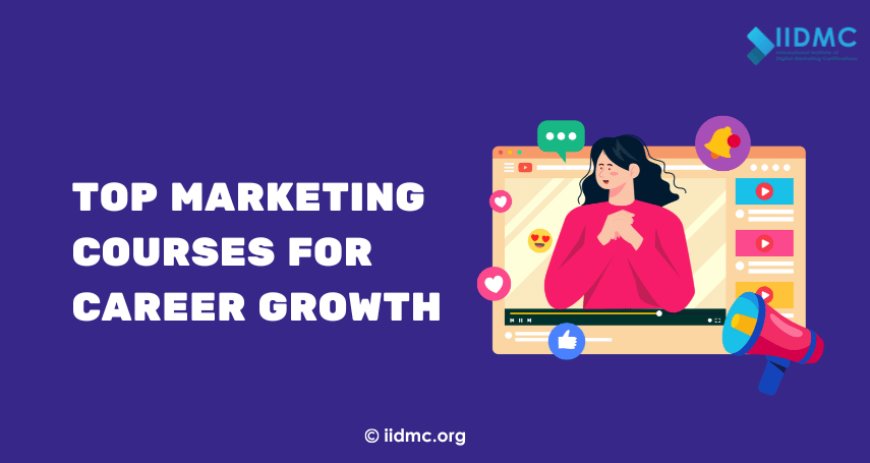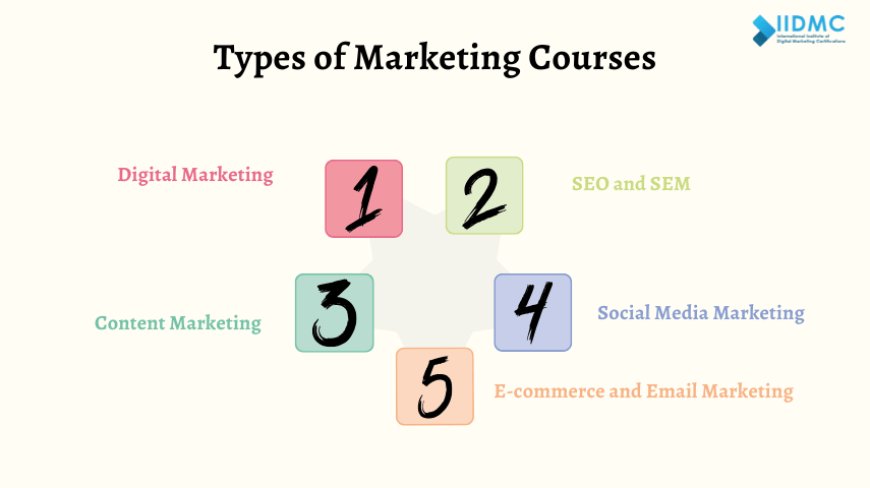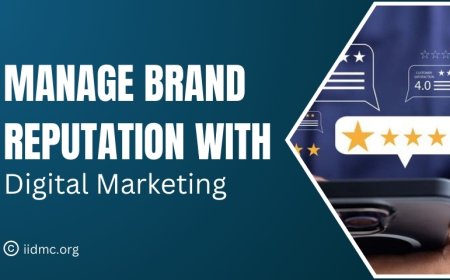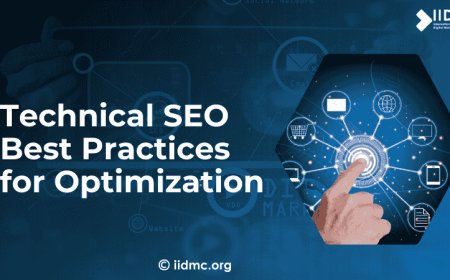Top Marketing Courses for Career Growth
Explore the top marketing courses designed to boost your career growth. Discover programs that cover digital marketing, SEO, social media, content strategy, and more, equipping you with the skills needed to excel in today’s competitive marketing landscape.

Having the right marketing skills can set you apart and open doors to exciting career opportunities. Whether you're just starting out or looking to take your marketing career to the next level, choosing the right courses can make a big difference. From mastering social media strategies to understanding the fundamentals of SEO and analytics, there’s a wide variety of marketing courses available to suit different skill levels and interests. In this blog, we’ll guide you through some of the top marketing courses designed to help you build expertise, boost your resume, and stay competitive in the field. Let’s explore the options that can help you achieve your career goals in marketing.
Why Marketing Courses Are Essential for Career Growth
Keeping Up with New Tools and Techniques
-
Courses provide experience with the latest marketing tools and software.
-
Learning to use these tools improves efficiency and impact in your work.
Broadening Your Skill Set
-
Courses cover various areas, from content creation to data analysis and customer engagement.
-
Building expertise across these skills makes you more versatile and valuable to employers.
Boosting Career Opportunities
-
Continuous learning shows commitment to growth, making you more attractive to recruiters.
-
Certifications can qualify you for specialized roles in areas like digital marketing, SEO, and email marketing.
Preparing for Leadership Roles
-
Up-to-date knowledge on trends and strategies helps you make informed, strategic decisions.
-
Continuous learning equips you with the skills to lead a team effectively and drive business results.
Key Skills Needed for Modern Marketing Careers
Digital Marketing Skills
-
Overview: Digital marketing involves promoting brands using online channels like email, websites, and online ads.
-
Skills Needed: Understanding digital platforms, online ad management, email marketing, and performance tracking.
-
Career Path Fit: Essential for Digital Marketing Specialists, who need to plan and run online ad campaigns and track their success.
Data Analytics
-
Overview: Analyzing data helps marketers understand customer behavior, preferences, and campaign performance.
-
Skills Needed: Familiarity with tools like Google Analytics, Excel, and data visualization software to interpret numbers and trends.
-
Career Path Fit: Ideal for Marketing Analysts or Strategists who use data to decide on marketing strategies and predict future trends.
Content Marketing
-
Overview: Content marketing focuses on creating engaging content to attract and retain a specific audience.
-
Skills Needed: Writing, storytelling, understanding of audience needs, and knowledge of various content types like blogs, videos, and infographics.
-
Career Path Fit: Great for Content Marketers and Brand Managers who develop brand stories and craft content that reflects the brand’s voice and values.
SEO (Search Engine Optimization)
-
Overview: SEO is about making content and websites more visible in search engine results.
-
Skills Needed: Keyword research, on-page and off-page optimization, understanding search engine algorithms.
-
Career Path Fit: Beneficial for SEO Specialists or Content Writers focused on increasing organic search traffic and visibility.
Social Media Strategy
-
Overview: Social media strategy involves creating and managing a brand’s presence on platforms like Instagram, Facebook, and Twitter.
-
Skills Needed: Knowledge of social media platforms, content planning, audience engagement, and basic graphic design.
-
Career Path Fit: Important for Social Media Managers who plan and execute social media campaigns to increase brand awareness and build community.
Customer Engagement
-
Overview: Customer engagement is about building strong relationships with customers, ensuring they feel valued and connected to the brand.
-
Skills Needed: Communication, empathy, CRM (Customer Relationship Management) tools, and understanding customer feedback.
-
Career Path Fit: Critical for Customer Engagement Managers and Brand Ambassadors who foster loyalty and maintain a positive brand image through personalized interactions.
Types of Marketing Courses to Consider

-
Digital Marketing
-
What’s Covered: Courses here focus on essential digital marketing topics like online strategy, social media, PPC (pay-per-click ads), and email marketing basics.
-
Why It’s Useful: These courses help you understand the main areas of digital marketing, making them ideal for those looking to get a broad view of digital promotion.
-
Content Marketing and Copywriting
-
What’s Covered: You’ll learn storytelling techniques, develop a brand voice, and build a content strategy that aligns with audience needs.
-
Why It’s Useful: If you’re interested in creating content or managing a brand’s messaging, these courses are valuable for building creative and strategic writing skills.
-
SEO and SEM
-
What’s Covered: Courses focus on understanding how search engines work, keyword research, on-page SEO, and SEM (search engine marketing).
-
Why It’s Useful: SEO and SEM skills are necessary for improving a brand’s visibility in search results, making these courses ideal for those looking to specialize in driving organic and paid traffic.
-
What’s Covered: These courses dive into strategies for specific platforms like Facebook, Instagram, LinkedIn, and Twitter, including content planning, engagement, and ads.
-
Why It’s Useful: Social media skills are essential for reaching customers online. If you’re interested in managing social channels, these courses give you the knowledge to engage audiences and build a brand’s presence.
-
E-commerce and Email Marketing
-
What’s Covered: Courses cover optimizing online sales funnels, improving the customer’s journey on e-commerce sites, and using email marketing to engage and retain customers.
-
Why It’s Useful: E-commerce and email marketing skills are ideal for anyone interested in driving online sales and customer loyalty, especially useful for roles focused on increasing revenue.
How to Choose the Right Marketing Course for Your Career Path
-
Identify Career Goals
-
Choose based on your desired role: data analytics, content creation, social media, or leadership.
-
Evaluate Skill Level
-
Beginners: Start with broad, introductory courses.
-
Intermediate: Focus on specific areas like advanced SEO or email marketing.
-
Advanced: Look for niche or strategy-based courses.
-
Consider Budget and Time
-
Set a budget and select courses that fit your available time—options range from free to paid, short to long-term.
-
Check Course Content and Instructors
-
Ensure the course covers relevant skills, and look for qualified instructors to add value to your learning.
-
Seek Hands-On Practice
-
Practical projects and certificates help you build experience and a portfolio.
-
Read Reviews and Get Recommendations
-
Look at student reviews and ask professionals for trusted course suggestions.
This guide helps you match your course selection to your goals, experience, and practical needs.
Tips for Maximizing the Impact of Your Marketing Education
-
Set Clear Goals and Apply Your Learning
-
Define what you want to achieve with each course—whether it’s gaining specific skills or qualifying for a job role.
-
Apply what you learn to real-world situations, like a personal project or a case study, to deepen your understanding and build confidence.
-
Network with Classmates and Instructors
-
Connect with other students and instructors, as they can offer valuable insights, job referrals, or freelance opportunities.
-
Join course-related groups or forums to keep in touch and stay updated on industry trends.
-
Build and Maintain an Updated Portfolio
-
Include any projects, case studies, or certifications from your courses in a portfolio. This shows employers or clients your skills in action.
-
Regularly update your portfolio with new work to reflect your growing expertise.
-
Seek Feedback and Improve
-
Ask instructors or classmates for feedback on your projects, as constructive input helps you refine your skills.
-
Use the feedback to continuously improve your work, making you more competitive in the job market.
-
Stay Consistent and Keep Learning
-
Schedule time regularly for studying and reviewing new skills, even after finishing a course. Consistency ensures your knowledge stays fresh and relevant.
By following these steps, you can turn your marketing education into a strong foundation for career growth and practical success.
Ongoing learning is essential for anyone aiming to grow and succeed in marketing. As the industry evolves, staying updated with new skills and tools allows you to remain competitive and adaptable. Starting with a course that aligns with your goals and current skill level, such as those offered by IIDMC (International Institute of Digital Marketing and Communication), is a great first step.
Certifications not only add credibility to your resume but also help you stand out to employers by demonstrating a commitment to professional growth. Embrace continuous education as a key part of your career journey in marketing, opening doors to new opportunities and advancement.





























